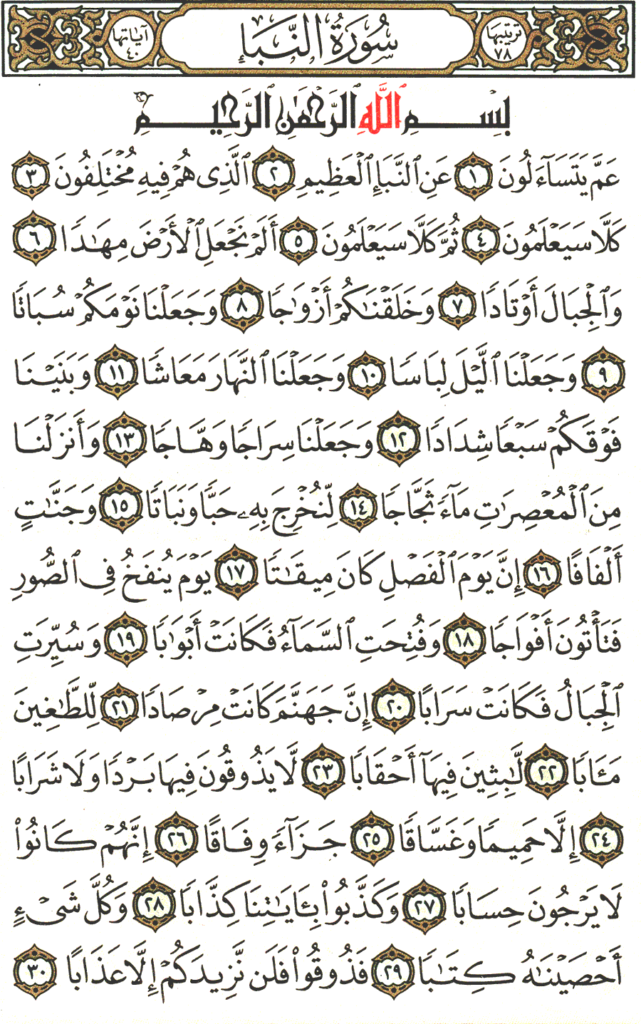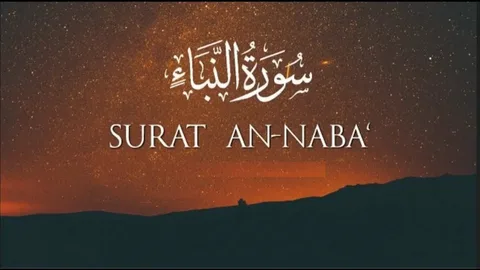Surah Naba, the 78th chapter of the Holy Quran, holds a special place in the hearts of Muslims worldwide. Known for its deep spiritual insights, the Surah outlines significant aspects of the afterlife and the great news (An-Naba’) that it presents to humanity, in this article on Arabian Tongue website we will explorer surah naba benefits.
Understanding Surah Naba

Surah Al-Naba, also known as “The Tidings” or “The Announcement,” is the 78th chapter of the Quran. It comprises 40 verses and is classified as a Meccan surah, meaning it was revealed in Mecca, generally in the early phase of Prophet Muhammad’s prophethood. This period is characterized by its focus on the basics of faith, the afterlife, and the accountability of human actions, which are prominent themes in Surah Al-Naba as well.
Historical Context and Themes

The Resurrection and Afterlife: Surah Al-Naba opens with a discussion about the “great news” over which there is disagreement among the people. This “great news” refers to the resurrection and the events of the Day of Judgment. The surah describes various scenes from the Day of Judgment, providing vivid imagery of what people will experience.
God’s Creation as Signs: The surah also points to various natural phenomena as signs of God’s power and mastery over creation. It mentions the creation of the earth, mountains, rain, and vegetation, emphasizing their roles in human life and their indicative power of a Creator.
Paradise and Hell: The latter part of the surah describes the rewards for the righteous in Paradise and the punishment for the wrongdoers in Hell. These descriptions serve as a reminder and a warning, aiming to guide the community towards ethical conduct and the worship of God.
surah naba benefits
Surah Naba, also known as Juz Amma Surahs List or Chapter 78 of the Quran, is highly revered in Islamic tradition and is believed to offer various spiritual and worldly benefits for those who recite it regularly. Here are some of the benefits associated with this Surah:
1. Spiritual Benefits
Reciting Surah Naba helps strengthen one’s connection with Allah, offering peace and a profound sense of purpose. It reminds us of the might and mercy of Allah, aiding believers in feeling more grounded and spiritually aligned.
2. Psychological Benefits
The soothing verses of Surah Naba can significantly aid in reducing anxiety and stress, providing mental clarity and a more positive outlook on life.
3. Social Benefits
It emphasizes patience and the importance of perseverance, fostering a community spirit of resilience and mutual respect among believers.
4. Physical Benefits
Though primarily a spiritual guide, the practices encouraged by Surah Naba, like regular prayer and meditation, can have positive effects on physical health.
Cultural Significance
Surah Al-Naba (Chapter 78 of the Quran), often referred to as “The Tidings” or “The Announcement,” holds significant cultural and religious importance in the Muslim world. Here are some aspects of its cultural significance:
- Recitation in Prayers: Surah Al-Naba is frequently recited in prayers, especially in the ‘Salat al-Witr’ (the odd-numbered prayer) and during the Tahajjud Prayer (night prayers). Its rhythmic verses and profound meanings make it a popular choice for recitation.
- Educational Importance: This Surah is often among the first chapters taught to children and new learners of the Quran due to its clear narrative style and the powerful depiction of the Day of Judgment, resurrection, and the bounties of Paradise versus the punishments of Hell.
- Reminder of the Hereafter: Surah Al-Naba discusses the realities of the afterlife, the resurrection, and the final judgment. This serves as a cultural reminder of the moral and ethical codes that Muslims strive to adhere to, impacting their daily lives and spiritual mindfulness.
- Themes of Unity and Diversity: The Surah mentions various natural phenomena as signs of God’s power and creativity. This can foster a sense of unity among people by reminding them of their shared origins and the common fate awaiting all humanity, promoting a culture of mutual respect and understanding.
- Literary Excellence: Like many other parts of the Quran, Surah Al-Naba is noted for its eloquent language and powerful imagery. It has influenced Arabic literature and poetry, as its verses are often cited for their beauty and depth.
- Spiritual Reflection and Comfort: The reassurances and descriptions of divine justice and the afterlife provide comfort and motivation to believers, reinforcing the moral and ethical values within the community.
Surah Naba in Daily Prayers
The Surah is frequently recited in prayers due to its profound messages and the spiritual upliftment it provides, often leading to personal transformations among Muslims. is often incorporated into daily prayers by Muslims due to its profound themes and powerful message. Here’s how Surah Naba is typically used in daily prayers:
- Tahajjud (Night Prayer): Surah Naba is a popular choice for recitation during the Tahajjud prayers, which are voluntary prayers performed late at night. Its verses about the signs of Day of Judgment, the creation of the universe, and the life hereafter resonate deeply in the quiet, reflective hours of the night.
- Witr Prayer: The Witr prayer, which is an odd-numbered prayer performed after the ‘Isha (night) prayer, often includes Surah Naba in one of the rak’ahs (units of prayer). The Surah’s emphatic discussion of the realities of the afterlife and divine judgment makes it suitable for the concluding prayers of the day.
- Jumu’ah (Friday Prayer): Although not specific to Surah Naba, its themes are pertinent to the reflective and communal nature of the Friday congregational prayers. Imams might recite it during the Jumu’ah prayers to remind the congregation of the Last Day and their responsibilities as believers.
- During Personal Reflection: Individuals may also choose to recite Surah Naba during their personal prayer times as a form of meditation and reflection on the creation of the universe and the ultimate return to God. Its verses encourage contemplation on one’s actions and the transient nature of life.
FAQs
What is Surah Naba about?
Surah Naba discusses the creation, the hereafter, and the divine justice system.
How can reciting Surah Naba benefit me spiritually?
It strengthens your connection with Allah and brings peace to your life.
Are there any specific times to recite Surah Naba for more benefits?
It is beneficial at any time but particularly during morning prayers.
How does Surah Naba impact mental health?
It helps in reducing stress and enhancing mental clarity through its reassuring verses.
Can Surah Naba's teachings be applied to modern-day issues?
Yes, its teachings are timeless and provide guidance on various contemporary issues.
Conclusion
Surah Naba offers a comprehensive guide for life and the hereafter, urging believers to contemplate their existence and purpose. It is a source of endless benefit and enlightenment for those who engage with its verses.


